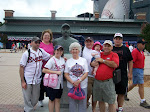Andy Andrews is becoming on of my favorite authors. In his book, Island of Saints, he helps the reader understand what forgiveness is all about. Hope you not only enjoy the quotes below, but I pray they will challenge you to live a Christ-like life!
It means giving something up. To relinquish something means to give up whatever power it holds over us. If you forgive somebody for something he did to you, that means you choose to never again allow that event to determine how you feel or how you act or even how you treat that person. You may remember the wrong, but by choosing to forgive, you have disarmed it. Then it can no longer determine what you think, what you say, or what you do. p. 120
. . . whenever you get hurt by somebody, you can either think about 'em all day long and let 'em keep hurting you inside . . . or give them to God. pp. 129-130
If you forgive them, it doesn't mean they get away with what they did . . . it just means that you don't have to think about it all the time. You can't do anything anyway, except be mad. See? You just give 'em to God. Then you can be happy. p. 130
In 1787, Alexander Tyler, a Scottish history professor at the University of Edinburgh, noticed a continuing pattern in the advance and decline of the world's democracies.
He stated then that a democracy would continue to exist until such time that the voters discover that they can literally vote themselves gifts from the public treasury. From the moment that revelation is made, the majority proceeds to vote for the candidates who promise the most benefits from the public treasury. The final result is that every democracy finally collapses due to loose fiscal policy. That collapse is always followed by a dictatorship.
Tyler charted the ages of the world's greatest civilizations from the beginning of history . . . an average existence of about two hundred years. Every single time, these nations progressed through the following sequence: from bondage to spiritual faith; from spiritual faith to great courage; from great courage to liberty; from liberty to abundance; from abundance to complacency; from complacency to apathy; from apathy to dependence; and finally from dependence into bondage. pp. 141-142 [ I realize there is no proof that Alexander Tyler said these things; however it does make sense. This is one reason we must make sure that the USA remains a Constitutional Republic.]
. . . we are products of our past, but we don't have to be prisoners of it. p. 149
. . . I must practice forgiveness. It is less an act than a determined way of living. I think that is why we are suppose to forgive "seventy times seven." True forgiveness comes only at the conclusion of an inner struggle. p. 149
. . . where is it written that for one person to forgive another, the offender must ask for forgiveness? Where is it written - not in the Bible, for sure - that for one person to forgive another, the offender must deserve it? p. 157
. . . where is it written that for one person to forgive another, the offender has to approve it, accept it, or even know about it? p. 157
. . . No man is an island if we choose not to forgive. Not to forgive means we yield ourselves to another person's control - another person's governing values and his attitudes and actions. We are forced by someone else into sequences of act and response, of outrage and revenge, and you know what? It always gets worse. Our present, when we refuse to forgive, is endlessly overwhelmed by the past. But we become an "island" when we forgive. The act sets us apart from the burdens of people we generally don't like in the first place! Forgiveness frees the forgiver p. 158
Sometimes we attach our entire lives to the moment we were hurt and allow it to define and consume our very existence. We travel with that hurt - that offense - and brood over it every time it comes to mind. We sleep with it, eat with it the "wrong" that has been done to us dictates how we speak to our children, our spouses, our friends . . . p. 158
Even when those who have mistreated us, abused us, cheated us, or oppressed us . . . even when they die, our anger and resentment do not have the decency to do the same! Our hurt continues to live. Until we forgive. There is no such thing as managing one's anger. It simply can't be done. The only answer is to forgive . . . and get rid of it forever. p. 158
. . . you are not concerned about what he is . . . only about what he can become. p. 189
Ephesians 4:32
32 Instead, be kind to each other, tenderhearted, forgiving one another, just as God through Christ has forgiven you.
To order this book click here!


2 comments:
I need to put this book on my must reads. I really needed to read this blog post. I am also going to print it out and read it to Bruce because this is definitely an area of his life that he struggles with along with many other things. Bruce has a lot of spiritual warfare and I am in daily prayer for his relationship with the Lord. He is slowly coming around. Bruce questions everything and struggles with his spiruality. I just ask that you lift Bruce up in prayers that he will find the peace that only our heavenly father can provide.
Glad is was a blessing and I will be praying!
Post a Comment